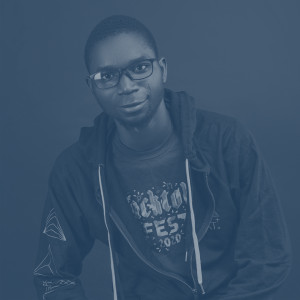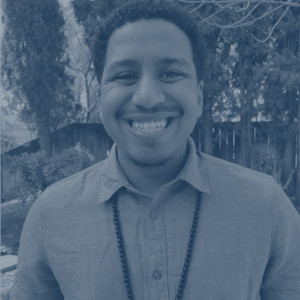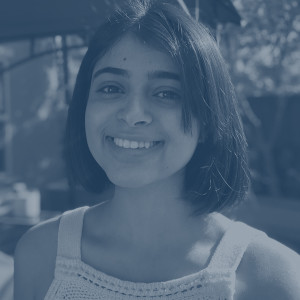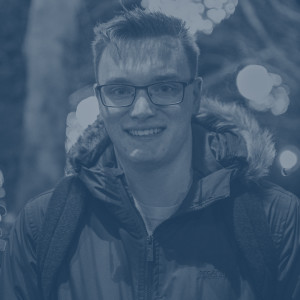Lavanya Sharma, 17
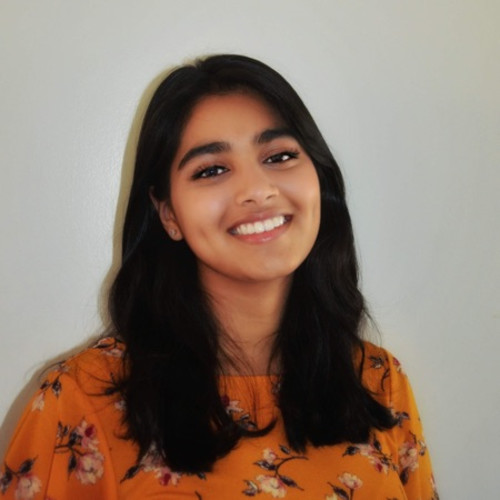
During her sophomore year of high school, Lavanya enrolled in AP Computer Science A, her first formal CS class in high school. She knew she was prepared, having learned how to code at just 10 years old, but this was an all new opportunity.
However, as she walked through the classroom door on the first day, she felt daunted. Out of forty students, a tenth of them were girls. She tried to bridge the gap by reaching out to her male peers, but after constant unwelcoming faces and blunt remarks, she found herself left to her own devices when it came to class projects. A few months later, she heard talk of hackathons. The idea was promising: 24-hour friendly competitions where students came to learn, code, and network alongside their peers. After an inhospitable welcome into tech, she felt the need to see what these promises of community were all about.
In early 2019, Lavanya took it upon herself to bring a hackathon to her area by co-founding AIHacks: Southern California’s first all-female high school hackathon, with a particular focus on artificial intelligence. The event was a success, hosting 100 students for the inaugural event at the USC Institute for Creative Technologies. The progressive efforts of the hackathon received support from organizations such as Stanford AI4ALL, Pixar Animation Studios, and Major League Hacking. The event has seen exponential growth, impacting the lives of over 500 girls through multiple AIHacks events, and realizing Lavanya’s dream of emphasizing the importance of equity in CS. From the leadership skills that came from this endeavor, she has since been given the opportunity to speak at various events hosted by organizations such as TechTogether, CSforALL, and Hack Club.
Throughout the stretch of hackathons Lavanya has attended, her favorite project that she was able to work on took place at the MLH Summer League’s Hack Girl Summer hackathon. She submitted Sully, a chatbot built with Artificial Intelligence and Machine Learning through Dialogflow that suggests local businesses to support based on the user’s request and geographical location. At the time of the submission, there was an extreme need to amplify small businesses due to the COVID-19 pandemic’s effect on local shops. With Sully, Lavanya created something that was both interactive and easy to use for local customers.
Imagining not pursuing hacking seems impossible to Lavanya, but the fact is that it was an option at one point. Despite having years of coding knowledge starting at such a young age, she became unconsciously conditioned to believe that there didn’t exist a place for her at the table. It felt more like a hobby, building robots with her dad at home and learning about Scratch on her PC, but when it came to joining the elementary school robotics club or competing on her high school’s cybersecurity team, she felt like an imposter. The constant societal expectations and stereotypes made her feel as if she didn’t belong among her male peers, even with her vast experience. Finding a community of girls who were equally as passionate about Computer Science showed her that she belonged; she was able to push through and put her skills to use, as she continues to do. With a reclaimed passion for computing thanks to her community, Lavanya is grateful to her younger self for not listening to the self-doubt and pushing herself to bring her where she is today. She intends to learn even more about computing at the University of Southern California, wh double-majoring in Computer Science & Business Administration at the University of Southern California, and she hopes to get involved in artificial intelligence research in the future.
Quick Facts
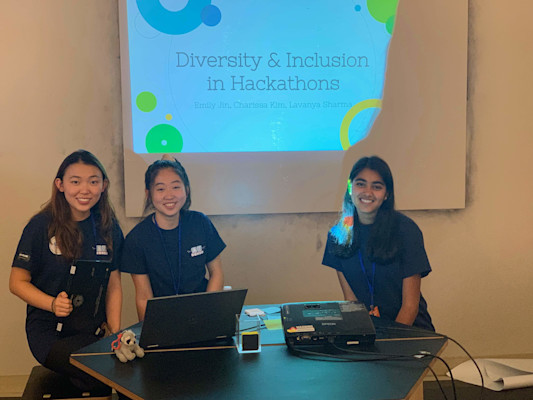
Lavanya Sharma, 17

During her sophomore year of high school, Lavanya enrolled in AP Computer Science A, her first formal CS class in high school. She knew she was prepared, having learned how to code at just 10 years old, but this was an all new opportunity.
However, as she walked through the classroom door on the first day, she felt daunted. Out of forty students, a tenth of them were girls. She tried to bridge the gap by reaching out to her male peers, but after constant unwelcoming faces and blunt remarks, she found herself left to her own devices when it came to class projects. A few months later, she heard talk of hackathons. The idea was promising: 24-hour friendly competitions where students came to learn, code, and network alongside their peers. After an inhospitable welcome into tech, she felt the need to see what these promises of community were all about.
In early 2019, Lavanya took it upon herself to bring a hackathon to her area by co-founding AIHacks: Southern California’s first all-female high school hackathon, with a particular focus on artificial intelligence. The event was a success, hosting 100 students for the inaugural event at the USC Institute for Creative Technologies. The progressive efforts of the hackathon received support from organizations such as Stanford AI4ALL, Pixar Animation Studios, and Major League Hacking. The event has seen exponential growth, impacting the lives of over 500 girls through multiple AIHacks events, and realizing Lavanya’s dream of emphasizing the importance of equity in CS. From the leadership skills that came from this endeavor, she has since been given the opportunity to speak at various events hosted by organizations such as TechTogether, CSforALL, and Hack Club.
Throughout the stretch of hackathons Lavanya has attended, her favorite project that she was able to work on took place at the MLH Summer League’s Hack Girl Summer hackathon. She submitted Sully, a chatbot built with Artificial Intelligence and Machine Learning through Dialogflow that suggests local businesses to support based on the user’s request and geographical location. At the time of the submission, there was an extreme need to amplify small businesses due to the COVID-19 pandemic’s effect on local shops. With Sully, Lavanya created something that was both interactive and easy to use for local customers.
Imagining not pursuing hacking seems impossible to Lavanya, but the fact is that it was an option at one point. Despite having years of coding knowledge starting at such a young age, she became unconsciously conditioned to believe that there didn’t exist a place for her at the table. It felt more like a hobby, building robots with her dad at home and learning about Scratch on her PC, but when it came to joining the elementary school robotics club or competing on her high school’s cybersecurity team, she felt like an imposter. The constant societal expectations and stereotypes made her feel as if she didn’t belong among her male peers, even with her vast experience. Finding a community of girls who were equally as passionate about Computer Science showed her that she belonged; she was able to push through and put her skills to use, as she continues to do. With a reclaimed passion for computing thanks to her community, Lavanya is grateful to her younger self for not listening to the self-doubt and pushing herself to bring her where she is today. She intends to learn even more about computing at the University of Southern California, wh double-majoring in Computer Science & Business Administration at the University of Southern California, and she hopes to get involved in artificial intelligence research in the future.
Quick Facts

